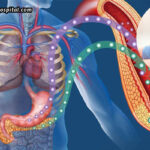Imagine a life where persistent stomach pain, bloating, and digestive discomfort are misunderstood and mismanaged, owing to widespread myths and misconceptions. Millions of individuals worldwide suffer from gastrointestinal disorders, yet many are still entangled in a web of false information that fuels unnecessary stigma and hinders effective treatment. It’s time to set the record straight and arm people with factual information on GI health. In this blog, we’ll dispel some of the most widespread myths regarding GI disorders, revealing their actual causes, symptoms, and treatments. So, come as we reveal the truth about GI disorders and open the door to better health and well-being.
Myth: GI disorders are always caused by a poor diet
While diet plays a significant role in digestive health, GI disorders are not always caused by poor dietary choices; certain conditions may involve genetic, environmental, and immunological factors too. For instance, the precise aetiology of IBS remains unclear, however abnormal GI motility, visceral hypersensitivity, and psychosocial variables are thought to be involved. Hence, food is not the only factor contributing to IBS symptoms, but food triggers can certainly worsen the symptoms. Then there are autoimmune conditions like Crohn’s disease and ulcerative colitis, in which the GI tract is wrongly attacked by the immune system. Although nutrition may have an impact on the intensity of the symptoms, genetic and immunological factors are the main causes of many disorders.
Myth: Stress is the sole cause of GI disorders
Just like some consider diet to be the main cause of GI disorders, others believe that stress is the sole cause of such problems. However, the truth is that although stress can have a major effect on GI symptoms, it is not the only factor that leads to the issues. As previously stated, a multitude of gastrointestinal disorders have complex aetiologies that encompass genetic, immunological, and environmental components. The brain-gut axis affects conditions like IBS and functional dyspepsia, and stress can aggravate symptoms, but it is not the only cause of these conditions. Similar to this, stress can exacerbate the symptoms of Crohn’s disease and ulcerative colitis, but it’s not the main cause for these issues to develop.
Myth: All GI disorders have the same symptoms
GI disorders are a broad category of diseases, each with unique symptoms. Even while several symptoms could be similar, there might be big differences in how each one manifests. For example, regurgitation, chest discomfort, and heartburn are typical signs of GERD. Complications from persistent GERD include Barrett’s oesophagus and esophagitis. The immunological reaction brought on by consuming gluten then results in nutritional deficits, weight loss, and diarrhoea, which are the signs of celiac disease. Other frequent non-gastrointestinal symptoms include anaemia and dermatitis herpetiformis. Another GI condition called IBS is typified by abdominal pain, bloating, and altered bowel habits like constipation, diarrhoea, or both.
Myth: GI disorders do not affect children
You’d be mistaken to believe that GI issues don’t impact kids. Despite the fact that adults are the primary population impacted by GERD, IBS, and other GI disorders, these issues can also affect infants, children, and adolescents due to poor sleep habits, stress, and unhealthy diets. Children may develop illnesses such inflammatory bowel disease, lactose intolerance, and celiac disease, which call for prompt diagnosis and treatment. Another common ailment in newborns that frequently goes away with age is GERD. However, severe or persistent symptoms could call for medical attention.
Myth: You should avoid all fatty foods if you have a GI disorder
If you have conditions such as fatty liver disease, bowel irritation, or the like, you will be advised to stop eating fatty foods. This does not imply, however, that you give up all kinds of fatty foods. Not every fatty product is harmful for your gastrointestinal tract. Important things to consider are the kind and quantity of fat intake. Trans fats and excessive saturated fats, which are included in processed and fried meals, might worsen symptoms, which is why they should be eliminated from the diet. However, healthy fats found in foods high in omega-3 fatty acids, such as walnuts, flaxseeds, and fatty fish, have anti-inflammatory qualities and may be advantageous for gastrointestinal health. Therefore, the secret to maintaining GI health is selecting good fat sources, but however, in moderation.
Myth: Probiotics are a cure-all for GI disorders
In the same way that some may suggest giving up fatty meals to treat gastrointestinal issues, others could suggest taking probiotics. Probiotics can be beneficial for certain GI disorders, but they are not a panacea for all of them. Probiotic efficacy is contingent upon the strain, dose, and health status of the individual. Some probiotic strains have shown promise in reducing symptoms of IBS, but results can vary from one individual to another. Additionally, probiotics have been demonstrated to help restore gut microbiota balance and lower the risk of diarrhoea, but only after using antibiotics. Therefore, it is advisable to speak with a healthcare professional to help decide whether probiotics are appropriate for a certain condition.
Myth: Over-the-counter medications are always safe for GI symptoms
While over-the-counter drugs may offer short-term respite from gastrointestinal problems, they are not necessarily suitable for long-term usage or for all patients. Some people may depend on laxatives to relieve constipation, but they fail to realize that laxative abuse can result in dependence and electrolyte imbalances. Thus, laxatives are not a permanent cure for frequent constipation. Similarly, long-term usage of antacids and acid reducers can disguise underlying issues and cause negative effects including decreased mineral absorption, even while they are useful for occasional heartburn. Because of this, seeking advice from a healthcare provider is crucial for an accurate diagnosis and recommended course of treatment.
As seen above, any myths you believe without understanding the facts might have much more serious consequences. Moreover, self-diagnosis and treatment based on heard or read information can lead to mismanagement and worsening of symptoms. Accurate diagnosis of GI disorders requires medical history, physical examination, and diagnostic tests such as endoscopy colonoscopy, and laboratory tests. And this, can only be done with the help of professionals. Hence, if you experience persistent or severe GI symptoms, consult a healthcare professional, such as the best gastro doctors in Ahmedabad at Mission Gastro Hospital, for expert care and tailored treatment. Here, you’ll receive individualized care and personalized treatment plans based on your specific condition and requirements, resulting in the best possible outcomes.








